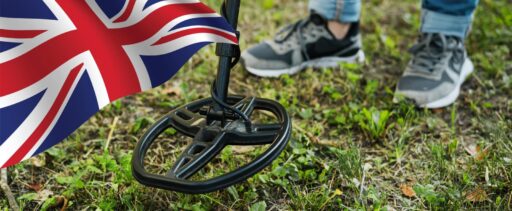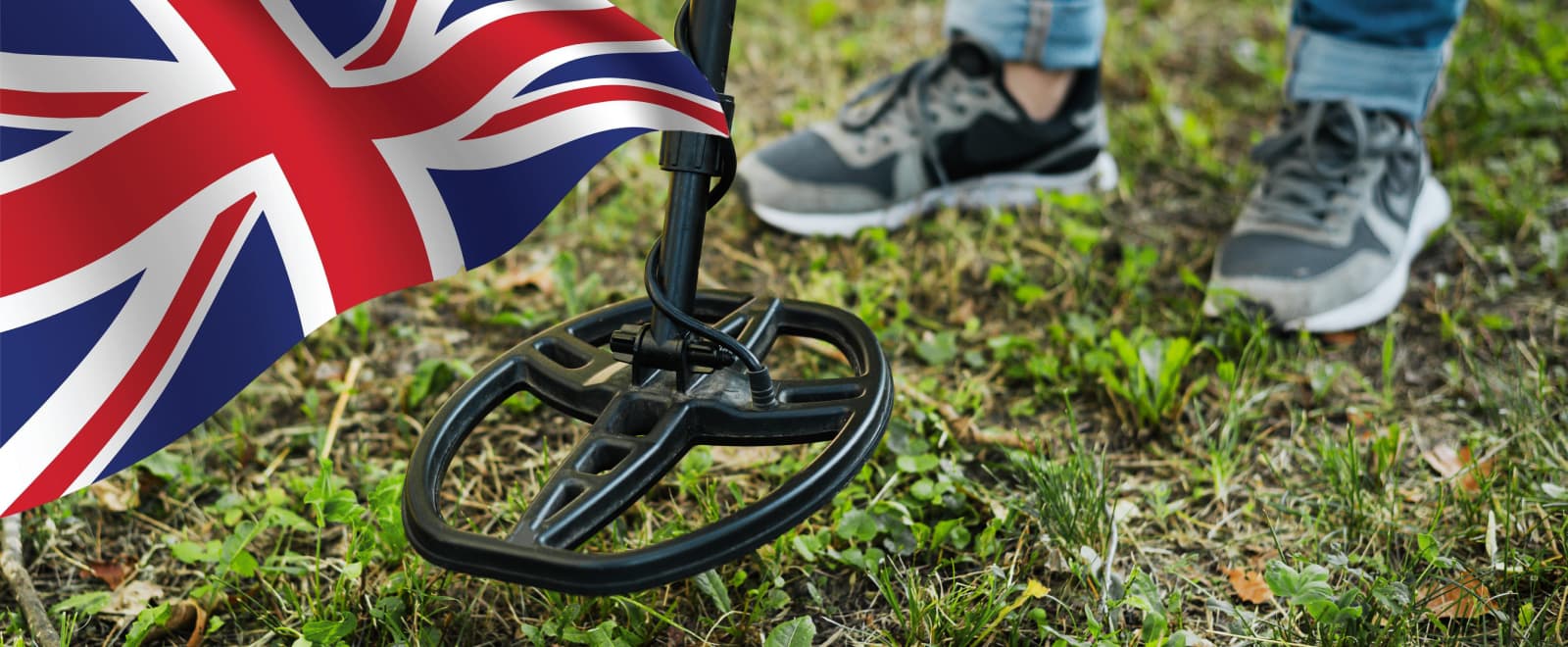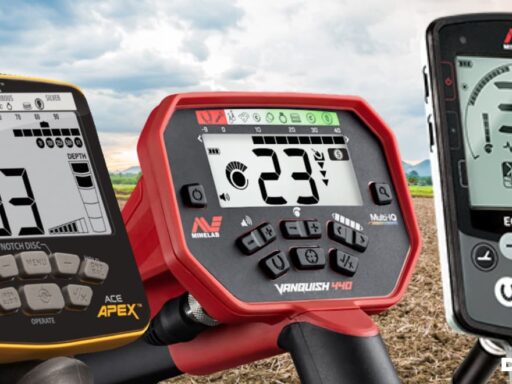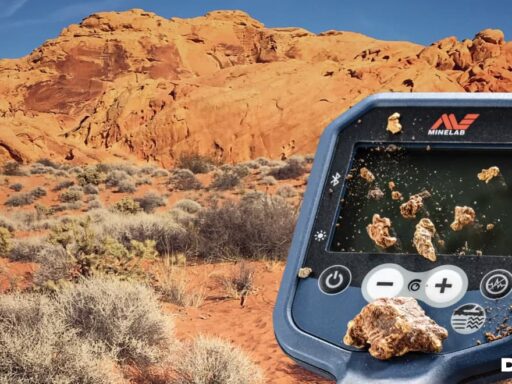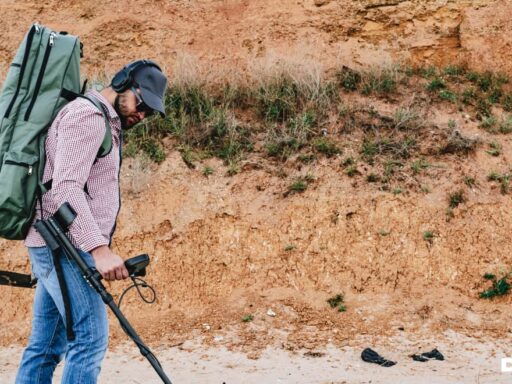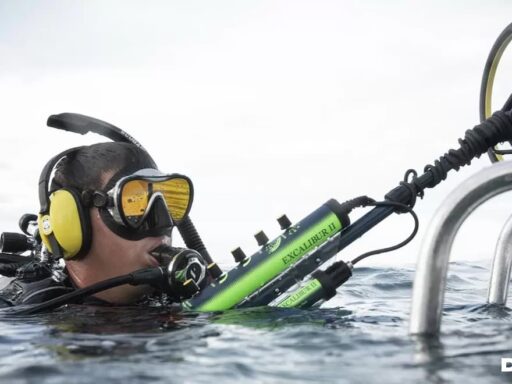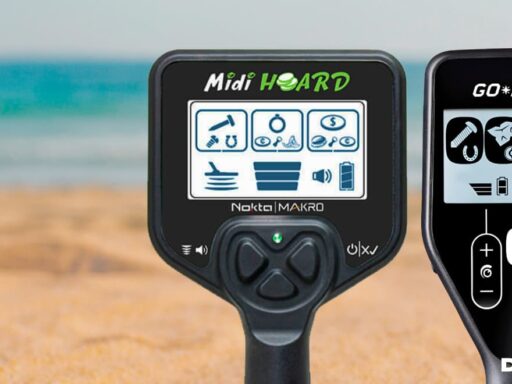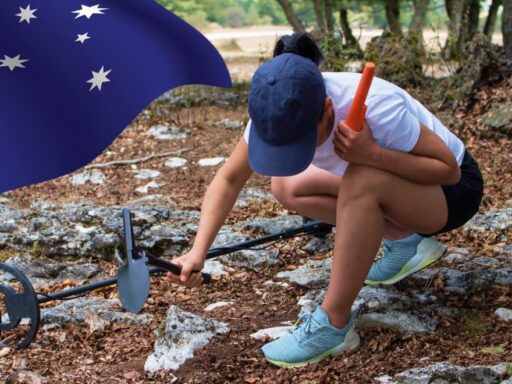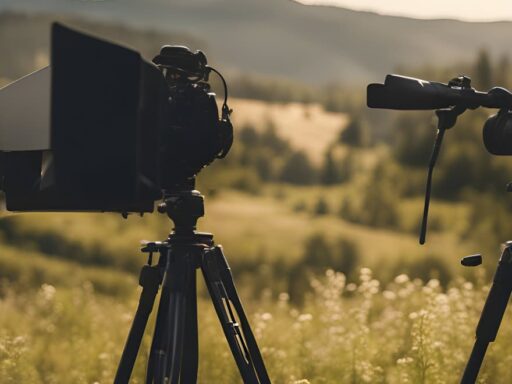In the UK, metal detecting and treasure hunting as hobbies are extremely popular and widespread, mostly because these lands are rich in all kinds of historical relics, treasures, and hoards, due to the long and eventful history of the British isles.
Due to the popularity of this hobby, and the risk of losing important historical and cultural heritage, the UK government has developed sets of very clear and comprehensive rules that are constantly updated.
So, local treasure hunters are given options and opportunities for their hobby, but they also have to follow the laws. Beginner metal seekers will also benefit from learning some basics; they can find everything they need to start the hobby.
Peculiarities of Metal Detecting in United Kingdom
One of the main curious peculiarities of local metal detecting in the UK is that there is a National Council for Metal Detecting, that has a written Constitution for metal seekers and members of the Council. The NCMD is a member of the Sport and Recreation Alliance, and works closely with all governmental structures to ensure that the hobby has ways of developing, and at the same time, the seekers obey the laws.
The NCMD was formed in 1981, and is a representative body of elected volunteers that collaborate with the responsible governmental agencies, provide memberships and licenses, develop rules of conduct, etc. All individual seekers or groups should obtain memberships or permits by the NCMD in order to pursue their hobby. The only aspect not covered by NCMD is archaeological interests.
Metal Detecting Laws in the UK
Disclaimer: The laws described in this section were in place at the time of writing the review. Unfortunately, the laws can be amended or changed quickly, and Detect History may fail to track the change fast enough to update the overview of the law. Therefore, it is important to double-check national laws and local rules in jurisdictions at all times. The best way to double-check is to contact the NCMD, a local metal detecting U.K club, or management of the location where the search session is planned, and ask about the laws in place.
The laws adopted by the UK government have been shaped into three sets of rules for all metal seekers. The rules should be followed at all times, and they include “Before you go metal detecting”, “While metal detecting”, and “After metal detecting” sets.
Before You Go Metal Detecting:
- Don’t trespass;
- Obtain landowner’s permission;
- Get agreement with the owner or tenant in place;
- Avoid protected sites (scheduled monuments, sites of special scientific interest or military crash sites, and those involving human remains);
- If you detect near protected sites, make sure you know the exact boundaries;
- Make sure you are aware of the portable antiquities scheme (pas) and can follow current scheme;
- Obtain public liability insurance to get protection from accidental damage;
While Metal Detecting:
- Prefer working on the land that has already been disturbed (like ploughed land) and only reach the depth already been disturbed;
- Avoid damage to archaeological value of the ground;
- Reinstate any ground or turf neatly;
- If you discover an object or a group of objects deeper than the ploughsoil level, you have to stop working and notify the landowner that you are seeking expert help. Contact the local finds liaison officer;
- Record all findspots for archaeological finds using GPS;
- Bag your finds individually and mark according to the national grid reference;
- Leave gates and property as you found them;
- Do not damage crops;
- Do not disturb wild or domestic animals;
- Do not disturb ground nesting birds;
- Remove litter you find;
After Metal Detecting:
- Report all archaeological or potentially valuable finds to the landowner, and make it clear for them that you want to follow the Portable Antiquities Scheme. Details of your local Finds Liaison Officer can be found at https://finds.org.uk/contacts;
- Follow the Treasure Act Code of Practice and Wreck Law;
- Any traces of human remains or a burial site should be reported to Police;
- Anything looking like an explosive, device, or ordnance, should be reported to the landowner and the Police. These objects should not be moved or touched;
- If you notice any illegal activity like theft of farm equipment, or illegal night-time metal detecting UK by unknown party, call the Police;
The Portable Antiquities Scheme (PAS) was developed as a universal scheme for all metal seekers to follow when reporting any archaeological finds (not only metals). PAS works with hundreds of parties, including Finds Liaison Officers, National Finds Advisers, volunteers, etc. Following the PAS does not mean that the finder should not follow the Treasure Act.
Treasure Act 1996
The Treasure Act of 1996 was created by the Parliament with the purpose of defining what objects can be classified with treasure, how these objects are to be reported, and what are the exact procedures. The Act is applied in England, Wales, and Northern Ireland. The main aspects discussed are what can be called treasure, who is the owner, how to report, and what reward can be expected by the finder.
According to the Treasure Act of 1996, treasures are:
- Any objects at least 300 years old or older;
- If this object is not a coin, but has at least 10 percent weight in precious metals;
- If coins, there should be at least two coins in the same find, at least 300 years old, and have some precious metals in them;
- And some other objects at least 200 years old (for more details please check full text of the Treasure Act);
What is not treasure:
- Unworked natural objects;
- Minerals from a natural deposit;
The ownership rights are as follows:
- The treasure belongs in a franchisee, if there is one;
- In the Crown;
There are some additional rules that define the ownership depending on where exactly the treasure was found, and in which circumstances it was left after it was found. The general rule is that objects classified as treasure belong either to the archaeological group researching the site, or to the Crown. If the object was revealed by a metal detectorist, they have the right to sell it to a museum and get the reward from the government in full; if the detectorist found the treasure on private property with the landowner’s\tenant’s permission, the reward is shared.
The order of notifying the coroner is as follows:
- A person who finds what they believe can be a treasure must notify the coroner within 14 days;
- The period of 14 days begins with the day after the find, or, the day on which the finder first believes what they found can be classified as treasure;
- Any person to fails to report is guilty of an offence;
- The punishment includes imprisonment for up to 3 months, a fine, or both;
- It is illegal for the finder to try selling the find, because if the find is a treasure, the finder does not own it;
The rewards are granted as follows:
- If the treasure belongs to the Crown with no other person’s right for reward, it is transferred to a museum;
- The Secretary of State determines whether a reward is to be granted, and if yes, they have to determine the treasure’s market value and the amount of the reward, and to whom the reward is to be paid;
- The museum has to pay the reward before getting the treasure (some museums collect huge grants only to be able to get this or that treasure);
According to the Treasure Act practices, when reporting a find, the metal detectorist will have to complete a special declaration form, provide GPS coordinates, and submit photos of the find. Moreover, it is forbidden to move or remove the find if the finder believes it can be a treasure. The finder should secure and cover the find safely, and make sure the case is processed by the Finds Liaison Officers. The process may take several weeks or months. Regardless of whether the find was removed, or secured, the treasure potentially belongs to the Crown, so the finder should take good care of it.
If the find is not a treasure, regulations on how to report, store, and take care of the finds at home can be found on the Portable Antiquities Scheme website.
Are There Any Special Regulations for Scotland and Northern Ireland
The Treasure Act of 1996 does nor work for metal detecting Scotland and the Isle of Man, and PAS is not applied to these areas, either. One of the main differences is that, in England, all finds reported via PAS are voluntary, but in metal detecting Scotland law, reporting is obligatory. In Scotland, Treasure Trove should be informed about any finds.
Metal Detecting – Scotland
For legal metal detecting in Scotland, the seekers should become members of the NCMD. When metal detecting on private property, metal detecting permission should be acquired. For detecting in public parks, permission should be acquired from local authorities.
Any scheduled sites are prohibited for detecting without permission from Historic Environment Scotland, and illegalt detecting is a criminal offense. Before detecting on any location, its status must be double-checked.
If anything potentially valuable is found, the finder has to report to Treasure Trove by filling a form, and sending an email with images, to treasuretrove@nms.ac.uk.
To report a find, the finders must:
- Record the findspot using GPS or Crown estate metal detecting map;
- Bad the find individually;
- Never clean the find or apply any substances to it;
- If the find is massive, like a hoard, it should be left in the ground and covered;
- Local archaeologist or Police should be contacted;
Fossils, animal bones, or mineral deposits must not be reported. Human remains should be reported to the Police. Wrecks should be reported to the Receiver of Wreck (row@mcga.gov.uk).
Metal Detecting in Northern Ireland
In 1995, the Historic Monuments and Archaeological Objects Order set restrictions on using metal detecting devices in Northern Ireland. The Order has the right to give “license to excavate” to archaeologists, historians, and experienced seekers who are engaged into legitimate archaeological research, or rescue excavations. Detecting and digging without a permit, or even possessing a hobby metal detector without this license is an offence.
It is prohibited to remove any archaeological objects found with a metal detector, without a written consent from relevant authority. Other restrictions are as follows:
- Removal objects from the ground without the landowner’s consent since, unless the object is a treasure of national value, any finds belong to the landowner;
- The person finding treasure, or seemingly valuable historical object, has to report to the relevant authority (Treasure Trove or local archeologist) within 14 days;
- Other relevant authorities that can be contacted include National Museums Northern Ireland, Historic Environment Division, Police station, Coroners Service for Northern Ireland;
- 14 days begin since the find was discovered, or since the day the finder became aware the find may be classified as a treasure;
In metal detecting Northern Ireland, the rules and approach are somewhat stricter than in England, but the point is that the authorities are seeking ways to support the interests of the public as a whole, and to prevent damage to ancient sites and historical heritage that belongs to all citizens, not only metal seekers. Strict rules are also created to prevent looting for personal gain, and to encourage collaboration between scientists and hobby seekers.
Where Can I Go Metal Detecting?
If you are aware of the laws and regulations applied in your jurisdiction, and wondering where actually you can go for metal detecting, this is the list of sites that usually work for most beginners:
- Parks;
- Woods;
- Gardens and orchards;
- Backyards;
- School areas;
- College and university parks;
- Sports grounds;
- Play grounds;
- Picnic areas;
- Camping areas;
- Lakes and rivers, banks of water bodies;
- Fishing areas;
- Beaches;
- Fields and pastures;
- Battlefields (but may be prohibited in the UK);
- Old towns and villages;
- Roadsides;
- Footpaths;
- Ghost towns;
- Abandoned buildings;
- Abandoned mines;
- Flea market sites;
Talking specifically about outstanding locations in the UK, you can try detecting in the following areas:
- North Yorkshire;
- Herefordshire;
- Buckinghamshire;
- Norfolk;
Public Land
Most public places like parks or roadsides are allowed for hobby metal detecting, but in practice, this only works if the treasure hunter has license and\or NCMD membership, and in any case, permit is required. The UK government reminds all seekers that all land, even public places like open-spaces, beaches, and foreshores, have its owners and occupiers\tenants. As a result, in reality, every detectorist requires both the landowner’s and tenant’s agreement.
Private Property
According to the UK law, the detectorist wishing to search on private property must have membership or license, must have insurance, and must seek permission of the landowner\tenant. The detectorist should search agreement, preferably in written form, about rules applied to their detecting activity, and should discuss possible compensation in case anything valuable is found on private property. The detectorist or group of seekers should follow code of conduct at all times, and stick to any specific rules, regulations, or recommendations about area boundaries, ploughing plans, etc., articulated by the landowner.
National Parks And Woods
It is allowed to metal detect in the woods which are held as public land, unless there is a private landowner. Sometimes, the forestry department will limit access to the forest, or activity in the forest, for metal seekers due to environmental or other reasons, such as mating season or bird nesting season. In most national parks, however, hobby detecting is prohibited, as only scheduled archaeological excavations are possible on these lands.
Metal Detecting UK Beaches
At the time of writing, hobby beach metal detecting UK does not have any specific regulations in addition to those numerous laws and rules stated above. All beach, shallow water, and underwater detecting seem to be subject to the same regulations. So, if you are interested specifically in metal detecting on beaches, check out the list of the best locations in the UK:
- Anglesey, Wales;
- Hastings, East Sussex;
- Silloth, Cumbria;
- Runswick Bay, Whitby;
- Morecambe, Lancashire;
Metal Detecting Code of Etiquette
UK Code of Ethics for metal seekers resembles the one that works in most other countries, and goes as follows:
- No trespassing; always ask for permission;
- Leave gates and property as you found them;
- Do not damage crops;
- Do not disturb livestock, domestic or wild animals;
- Do not disturb nesting birds;
- Minimize damaging the vegetation;
- Make sure the site is clean and safe after detecting;
- Fill in the holes;
- Remove all the trash you find;
- Do not disturb live ammunition; mark the site and report;
- Report all finds to the landowner and to the relevant authorities;
- Do not detect on scheduled monuments, sites of special scientific interest, or ministry of defence property without permission;
- Be a goodwill ambassador of british metal detecting at all times, and explain the hobby to people asking you about it;
- Report any criminal activities;
- Do not damage fish habitat;
- Do not contaminate water bodies;
What Valuables You Can Find
Talking about UK and European metal detecting as such, there are many pretty much standard items you can expect to find, including but not limited to:
- Coins;
- Buttons and buckles;
- Old and modern jewelry;
- All kinds of historical relics;
- Ammunition;
- WWII relics;
Moreover, if you have deep seeking, powerful metal detector, you can also find metal ores and mineral deposits, including:
- Tin;
- Lithium;
- Gold;
- Silver;
- Copper;
- Diamonds;
- Sapphires;
- Ruby;
- Beryl;
- Amethyst;
- Agate;
- Jasper;
- Jet;
- Amber;
- Topaz;
- Tourmaline;
- Hematite;
- Turquoise;
Despite the fact that the British Isles are rich in minerals and gems, the most desired finds these lands are rich in are historical relics, because Britain has seen lots of historical events.
Ancient Relics
Talking about ancient finds, treasure hunters can look for the relics by local cultures like Celts, Picts, and Scots, and these relics can be many. Other historical relics are left by the cultures of conquerors – Saxon tribes, Vikings, and even soldiers of the Roman Empire. Already in the IV-V centuries Britain belonged to the Roman Empire, and many rich immigrants granted huge lands on the British Isles brought their riches with them.
In the IX-X centuries, Britain became the target of the neighboring Viking peoples, some of them trying to conquer the lands, while others tried to establish trading routes and schemes, all of them bringing their riches with them, and also sharing their skills with the local peoples. Even today, it is totally possible to find a relic from the Roman Empire times or Viking raids times on the British shores.
Middle Ages
Strictly speaking, the Middle Ages in Britain started in the V century and lasted until the XV century. There are two main outstanding aspects during this period that created lots of treasures, and eventually these treasures are now desired by the seekers. These aspects are development of the knighthood phenomenon, and development of the Christian church. While aristocracy and knights accumulated huge treasures and inherited them, the monasteries and abbeys, in their turn, also created and accumulated treasures. These treasures were better documented and managed than those of the Roman Empire or Viking eras, this is why it is harder to find one unattended today. However, this is still possible, and almost every year British seekers spot another hoard that dates back to the Medieval times.
WWII and the 20th Century
The Industrial Revolution in the 19th century and WWII in the 20th century created less treasures on the British lands, but they definitely left lots of other relics. Those passionate about history, or about these two specific periods in history, can also hunt down some significant and valuable items. These items are unlikely to be marked as treasures unless they are remarkably valuable, but Industrial Revolution or WWII period items can have significant cultural importance.
What To Do With the Finds?
According to the Treasure Act of 1996, all objects should be reported for the sake of classification, and objects that seemingly classify as treasure should be reported within 14 days. If the object is claimed as a treasure, it will be transferred to a museum, and if the finder or owner are eligible for a reward, the reward will be granted.
If the object cannot be classified as treasure, but seemingly classify as archaeologically interesting or important, it should be reported according to the Portable Antiquities Scheme. The Scheme has several variations for the sake of finders’ and authorities’ convenience. The aims of PAS are to advance knowledge of history and archaeology, to raise awareness and promote education among the public on the importance of historical heritage, to enhance collaboration between metal seekers and archaeologists, etc.
The metal detecting UK law states that all valuable or historically important objects are the property of the Crown and therefore they cannot be attempted to be sold to a private collector, or kept for one’s own collection. They should be transferred to a museum, with or without a reward to the finder/landowner. Only if no museum is interested in accepting the find, the finder or landowner are allowed to keep the find.
If you are allowed to keep the find, you are free to use it as you wish – leaving in your own collection, selling it, etc. But please keep in mind that you will require additional documents and Crown estate metal detecting permit if you try to transport archaeological finds abroad, even if they are of no interest to local museums.
Where to Look for Help?
This overview gives quite a broad set of recommendations and explanations on local laws in the UK, however, even the most experienced seekers might need some help, recommendation, or advice. Beginner seekers, moreover, may require recommendations and tips even in the most basic aspects. For beginners, we recommend checking out our book available online and as a paperback. The book explains the basics of metal detecting, throws light on some important nuances, and helps to avoid typical newbie mistakes. Detect History blog also has a lot of useful posts and guidelines. Moreover, both beginner and seasoned treasure hunters can seek help on UK metal detecting forum, in social network groups, and in local metal detecting UK clubs.
Forums and Social Networks
There are many international metal detecting forums gathering like-minded folks from all over the world. The top metal detecting forums UK include Treasure Net, Find’s Treasure, Detector Prospector, and others. You can check out the list of the best international forums in this blog post. As for local British metal detecting forums,they are MDF Metal Detecting Group, UK Detector Net, and Metal Detecting UK Forum. You can also look for local groups and public accounts on metal detecting, prospecting, and treasure hunting, in social networks you use. However, the best option is to join a local metal detecting club.
Metal Detecting Clubs UK
The advantages of joining a UK metal detecting club are obvious: clubs are usually tightly knit communities of like-minded people that share knowledge and experience, make search sessions or travel to distant locations together, make organized license or metal detecting permit UK acquisitions for their members, can lend or rent out their equipment to another member, etc. Beginner seekers would benefit hugely from joining a club.
Local clubs in the UK include (at the time of writing):
- Wessex Metal Detecting Club
- The Berkshire seekers
- “MAGIOVINIVM” Milton Keynes Metal Detecting Club
- Central Searchers Metal Detecting Club
- Ramsey Metal Detecting Club
- South Lancs and Cheshire Club
- Mid Cornwall History Hunters
- Kernow Search & Recovery Club Cornwall
- Kendal & District Metal Detecting Club
- Torbay Metal Detectors Club
- Weymouth & Portland Metal Detecting Club
- Taynton Metal Detecting Club
- Weekend Wanderers
- West Kent Detector Club
- Loughborough Coin & Search Society
- Kings Lynn Metal Detecting Club
- The Somerset Artefact Seekers
- Ipswich & District Detector Club
- Surrey Searchers Metal Detecting Club
- Doncaster Detector & Collectors Club
Metal detecting clubs Scotland:
Metal detecting Wales:
Northern Ireland:
Cultural Life: Metal Detecting Rallies
There are several metal detecting rallies held in the UK on a regular basis. The biggest and the most famous one is Detectival. Detectival was created in 2016, and since then, this event brings together manufacturers, traders, and passionate seekers from many countries, not only the UK. The rally includes release presentations, competitions, and even activities for charity.
Other big rallies include Detectorcon, Medway History Finders Metal Detecting Club Rally, The Rodney Cook Memorial Rally, and Kimbo’s Detecting Society Week Long Marathon Rally. The list is not full, though, so please research more about events in your area. Moreover, even total newbies can give it a try with a metal detector – or even gold panning! – by joining specialized metal detecting tours in their area. Some of the most well-known tours are Colchester Treasure Hunting and Metal Detecting Holidays, and Metal Detecting Tours England.
FAQ
Some farmers indeed do allow metal detecting on a regular basis. At the time of writing, Pete’s Airgun Farm in Essex is one of the locations where metal seekers are welcomed. Check out farms in your area, and you are likely to find at least one that will be available for treasure hunting.
In public areas with metal detecting licence and NCMD membership, and on private property with license, membership, insurance, and landowner’s / tenant’s permission.
There are lots of metal detecting land available – public parks, fields, woods, roadsides, beaches, river banks, etc.
To start metal detecting, you will need to know what locations are available to you, what finds you want or expect, and what metal detector exactly you need. To start metal detecting hobby successfully, check out Detect History guidelines, blog, or “Time to Detect” book.
You’d better not until you get the item evaluated by the expert. Some ancient items can be permanently damaged by the attempt to clean them, and lose their value; and considering that all treasures belong to the Crown, you don’t want to destroy a valuable item you found. So, no cleaning until the expert tells you the significance and value; only if no museum wants your find, you can clean it and keep it.
There are few places where you can go metal detecting without permission in the UK, mostly because every detectorist needs a license and a membership in the NCMD. You can detect in your backyard, of course, but again, if you find something valuable, you have to report, which again leads to the necessity of a license.
